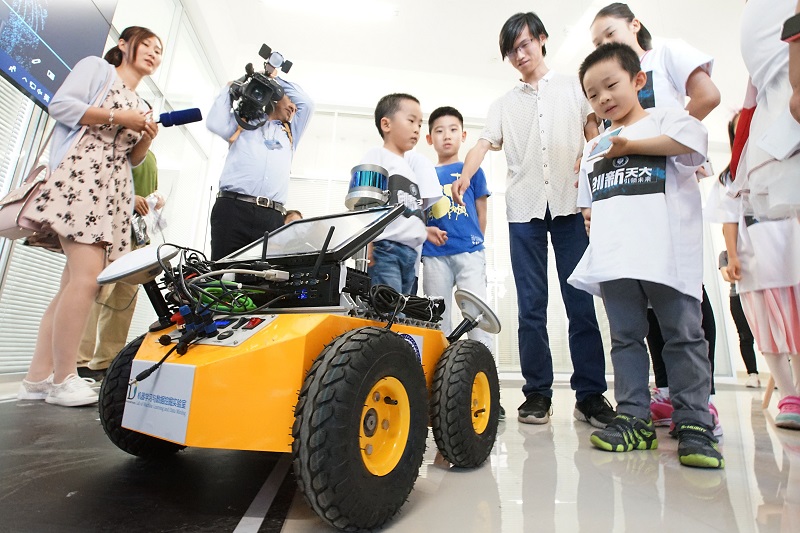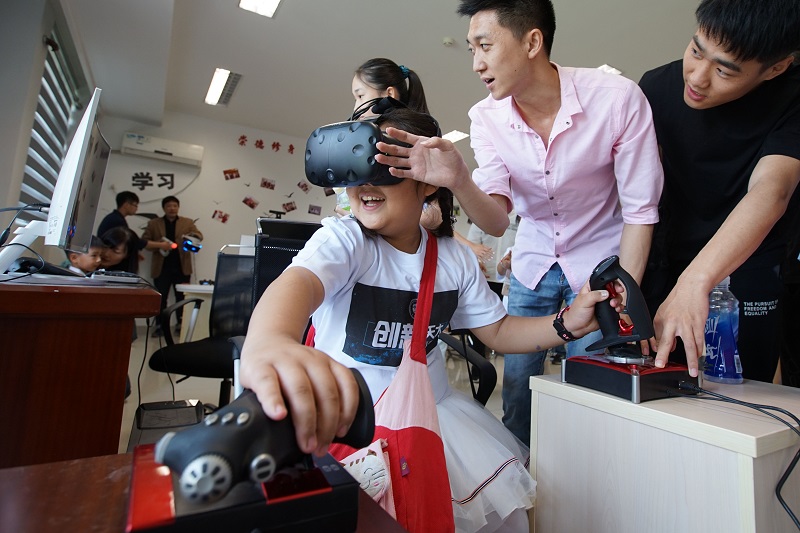As Steven Spielberg’s Ready Player One becomes a hit, which describes a world where people use the virtual reality software OASIS to escape from the real world, Artificial Intelligence (AI) is once again the center of discussion. It is said that the future is an era of AI, but what does it look like?
Recently, the first academic forum of the 2nd World Intelligence Congress, the Big Data and Intelligence Summit, was held at Peiyangyuan Campus of Tianjin University. The two-day high-end forum not only attracted more than 170 experts and scholars in big data at home and abroad, but also invited nearly 20 “young journalists”, composed of primary and secondary school students, to experience on-site AI.
They experienced facial scan payment, controlling unmanned vehicles, and simulating aircraft piloting and so forth. This “date with the future” began with many AI games.

In the “face recognition system” part, the young journalists first learned about the power of this system by experiencing it. By scanning a person’s face, the system can correctly recognize people’s identity so that people can pass through the access control system without swiping a card. After that, the little journalists were invited into a model of self-service stores, where costumers only need to place the products on the cashier counter, then the prices can be automatically calculated, and customers pay for the products by a facial scan.
In the “unmanned vehicle” part, they learned that unmanned aerial vehicles can monitor road conditions through on-board cameras, and driverless cars can automatically avoid collision by analyzing data with sensors. Then, a small robot standing on the ground caught their eyes. When they came close to it, it waved its hand to greet them, which immediately delighted them.
In order to further educate the young journalists, the staff also showed many Virtual Reality (VR) and Augmented Reality (AR) products, including VR flight simulator, VR shooting game, VR Herb Garden, AR Digital Museum and etc.
One of the staff members introduced a VR product for cervical rehabilitation, which combines medical technology and traditional Chinese culture. Firstly, a user wears a pair of VR glasses and rotates his neck according to guidance on the virtual screen to test his cervical flexibility. Then, by moving their head to write traditional Chinese characters shown on the virtual screen, he can do a set of cervical exercises while learning traditional Chinese characters. According to the staff’s introduction, doing such exercise three times a day and writing 20 Chinese characters at a time will greatly benefit the rehabilitation of the cervical spine. Moreover, this VR product can record the user's cervical spine flexibility data and send the user's progress report to the doctor to help further treatment, realizing the integration of VR technology and the Internet of Things.

"This game looks so realistic," said Liu Jingyu, a student of Tianjin Experimental Primary School. She just experienced an AR shooting game, in which sensors can automatically display a real-time shooting scene based on the surrounding environment, and the player only needs to gently flick the index finger to manipulate the whole scene.
Weng Zhongming, associate Professor of the Digital Media Technology Laboratory, said that this exhibition showed some products which children are more interested in, but their work is far more than that. The laboratory now focuses on virtual reality, rehabilitation, 3D modeling, and medical imaging. Through cooperation with other institutions, the Laboratory completed many programs. The Herb Garden is one of their cooperation achievements with Tianjin University of Traditional Chinese Medicine and other institutions, others include Marine Engineering Operation Risk Management System, Virtual Acupuncture Training System etc.
The Summit was expected to encourage children to learn more about artificial intelligence. “Artificial intelligence is an industry that comes from people’s imagination and expectation, and an industry that make a better future,” said Weng Zhongming.
Besides playing AI games, the journalists were also invited to experience the atmosphere of academic conferences.
Mr. Zhao, a parent of a young journalist, said that children have their own insights on these high technologies. In the future, he will continue to encourage his kid to participate in such activities to broaden his horizons and enhance his self-confidence.
By: Zhao Han
Editors: Qin Mian and Keith Harrington






